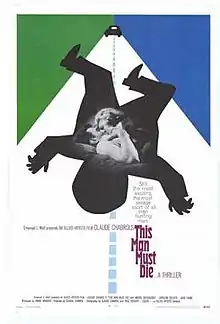This Man Must Die
This Man Must Die (French: Que la bête meure), American title The Beast Must Die, is a 1969 French and Italian psychological thriller film directed by Claude Chabrol. The story is based on a 1938 novel by Cecil Day-Lewis, writing as Nicholas Blake, The Beast Must Die. A widower, obsessed with revenge after his only son is killed in a hit-and-run incident, tracks down and seduces the driver's mistress who was in the car at the time but his efforts to kill the driver misfire.
| This Man Must Die | |
|---|---|
 American film poster | |
| Directed by | Claude Chabrol |
| Produced by | André Génovès |
| Written by | Claude Chabrol Paul Gégauff |
| Based on | The Beast Must Die by Nicholas Blake |
| Starring | Michel Duchaussoy Caroline Cellier Jean Yanne |
| Music by | Pierre Jansen |
| Cinematography | Jean Rabier |
| Edited by | Jacques Gaillard |
| Distributed by | Allied Artists Pictures Corporation (United States) |
Release date |
|
Running time | 110 mins |
| Country | France Italy |
| Language | French |
| Box office | $8.2 million |
The film had a total of 1,092,910 admissions in France.[1]
Plot
A sports car races through the countryside. A young woman is in the passenger seat. It enters a small village at high speed. It hits Charles Thénier's nine-year-old son, who is returning from the beach, and drives on without stopping. Charles vows to have his revenge, keeping a journal of his thoughts.
The police investigation is fruitless. Charles thinks the guilty party may run a garage, since there is no record of a car going in for repairs. By chance, while pursuing this hunch, he discovers that the actress Hélène Lanson was the passenger in a car that was damaged on the day of his son's death. Adopting a pseudonym, he seduces her and discovers that the driver was her brother-in-law Paul Decourt. He arranges a trip with Hélène to visit her sister's family in Brittany.
Charles discovers that Paul is detestable, cruel to his wife and hated by his teenage son Philippe. He has conflicting thoughts as to whether or not he will kill Paul. He rescues him from a cliff-fall. Philippe confides to Charles his own desire to kill his father.
Hélène confesses that she once slept with Paul. Charles presses her to explain more of her anxiety about Paul, but she refuses to add anything.
Charles decides to kill Paul in a staged sailing accident and buys a boat for that purpose. However, while at sea, Paul pulls a gun on him and reveals that he has read Charles' journal and passed it to his solicitor to take to the police should something happen to him. After returning to the harbor, Paul throws Charles out of his house.
Charles appears to abandon his plan to murder Paul and drives away with Hélène. In a roadside restaurant, a television announcer reports Paul's death from poisoning and appeals for Charles and Hélène to return, which they do. Charles argues to the police that it would be foolhardy for him to kill Paul when he knew the journal would reach them. They contend that Charles has planned to use this argument to deflect their suspicions, and arrest him. However, Philippe enters and confesses to the murder.
Back at their hotel, Charles is weary and promises to tell Hélène the entire story the next day. She wakes to find his note explaining that Philippe has confessed falsely to the crime Charles himself committed. He tells her to share his confession with the police and that he will punish himself and never be seen again. He is seen sailing oceanward.
Selected cast
- Michel Duchaussoy as Charles Thénier
- Caroline Cellier as Hélène Lanson
- Jean Yanne as Paul Decourt
- Anouk Ferjac as Jeanne Decourt
- Marc Di Napoli as Philippe Decourt
- Louise Chevalier as Madame Levenes
- Dominique Zardi as Police Inspector
- Maurice Pialat as Police Commissioner
References
- "Que la bete meure (1969) - JPBox-Office". www.jpbox-office.com. Retrieved 2019-09-09.